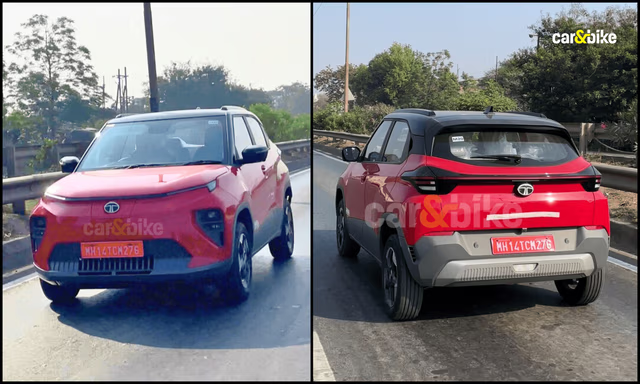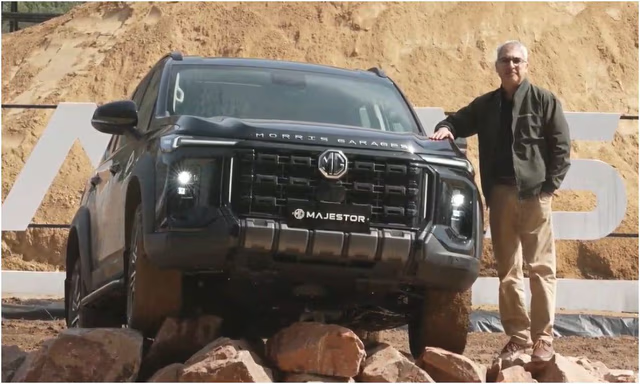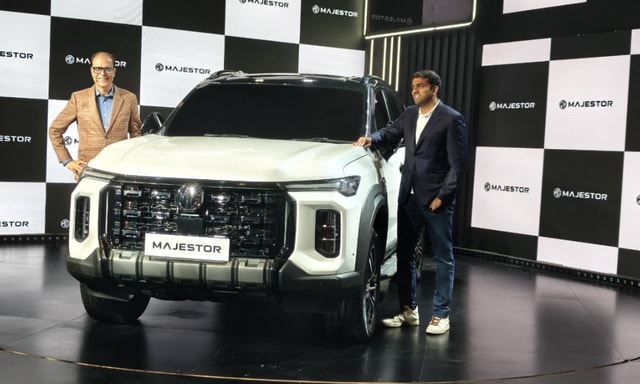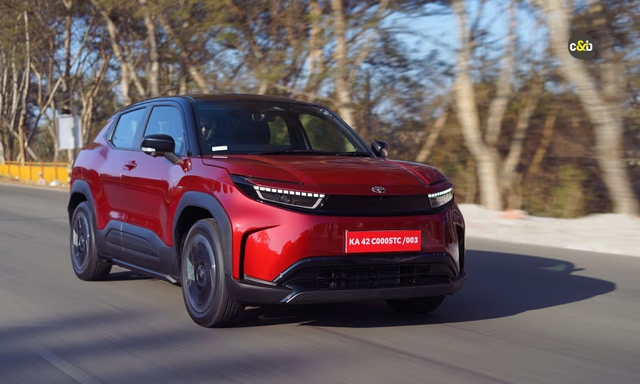EV Boom Requires US To Change Weight Limits For Trucks
- With the advent of electric cars, vehicles have been becoming heavier
- The batteries have been the key reason behind the added weight
- Now, there is demand for US to change regulations on maximum truck weight
Car haulers are pushing the Biden administration and lawmakers to increase truck weight limits on U.S. highways so they can transport more heavy electric vehicles, a move fiercely opposed by the rail industry and safety advocates who say the heavier loads are significantly more dangerous.
Even before a recent spike in EV sales, U.S. roads have been carrying heavier loads, as cars and trucks climbed from an average of 3,200 pounds (1,451 kilos) to 4,200 pounds over the last four decades, according to the Environmental Protection Agency.
Electric vehicles, with their heavy batteries, weigh significantly more than gas-fueled cars. While they make up less than 1% of cars on U.S. roads, President Joe Biden wants EVs to reach half of vehicle sales by 2030, and he and his Democratic Party have put billions in federal funds behind the goal.
Car haulers, the pipeline of the auto industry, move thousands of cars each day from factory parking lots, ports and rail yards to dealers, often using open double-decker trailers. If decades-old U.S. road weight limits are not increased, it could slow deliveries and increase costs, putting at risk this historic bet on zero-emission vehicles, they say.
"The truth is we will not be able move as many electric vehicles under the current weight limit. That could mean more trucks on the road, delays in orders and increased costs," said Sarah Amico, executive chairman of Jack Cooper, among the largest car haulers in North America.
Individual trailers are currently restricted by federal highway safety standards dating to 1975 to 80,000 pounds gross vehicle weight, including a truck and trailer that can account for half of the limit.
In recent months, the car hauling industry has stepped up lobbying efforts with lawmakers on key committees and officials at the Department of Transportation, Commerce and the White House National Economic Council, interviews with industry and administration officials show.
They have pled their case in face-to-face meetings, letters, and round tables. However, the move is firmly opposed by their rivals in the freight rail industry, and safety experts who warn heavier vehicles are harder to stop, easier to roll and result in more wear and tear on roads and bridges.
This is the latest effort by the trucking industry to leverage a political situation like growing interest in EVs to push for higher weight limits, something motorists oppose, says Cathy Chase, President of Advocates for Highway and Auto Safety.
"With any incremental change comes incremental danger, and that results in more fatalities," Chase said. U.S. traffic fatality rates are higher than Europe, and deaths have jumped since the pandemic to nearly 43,000 people a year.
The U.S. Department of Transportation declined to say whether it supports or opposes lifting weight limits on car haulers, noting the ultimate decision lies with Congress
Congressional committees overseeing transportation said they have yet to take a position on the issue.
However, Rodney Davis, a Republican lawmaker from Illinois who serves on the House Transportation Committee and is ranking member on the highway subcommittee, says he's working to increase weight limits.
"The auto transporter industry needs a modest 5% to 10% weight variance. Otherwise, an already-challenged supply chain will require more tractor-trailer rigs on the nation’s highways to deliver the same number of finished vehicles. That means more miles driven, more wear and tear on our roads, more fuel used, and more emissions," Davis said.
The American Trucking Associations has asked lawmakers to increase the weight limit by 10%, to 88,000 pounds, saying the current weight limit is unsustainable given the trends.
That extra 8,000 pounds could allow car haulers to carry the same number of EVs as traditional cars: Ford’s new F-150 Lightning all-electric pickup truck weighs about 1,600 pounds more than its gas-powered F-150 counterpart. Similarly, the all-electric Volvo XC40 Recharge SUV weighs about 1,000 pounds more than a gas-powered Volvo XC40.
Hyundai Motor and Kia sold twice as many EVs in the U.S. in the first seven months of this year than all of 2021; sales for market leader Tesla are also outpacing last year.
One industry idea is higher weights for up to 300 miles. Haulers often unload a car by then, putting them under the 80,000 pound limit. California, which just passed a law banning sales of gasoline-powered cars by 2035, has done essentially that, increasing weight limits for trucks carrying goods in and out of its ports to ease supply-chain bottlenecks and clear containers off the docks of Los Angeles and Long Beach. Temporary permits starting in November of last year lift weight restrictions for trucks to 88,000 pounds. The state hasn't researched whether increasing the weight limits helped ease congestion or posed a safety risk.
“The department is also not aware of an collisions or other safety impacts of trucks that are utilizing these permits,” William Arnold, a California transportation department spokesman, said.
(Reporting By Jarrett Renshaw; Editing by Heather Timmons and Alistair Bell)
Latest News
 car&bike Team | Feb 12, 2026Tata Punch EV Facelift Spotted Ahead Of February 20 LaunchThe Punch EV facelift appears to be identical to the ICE counterpart.4 mins read
car&bike Team | Feb 12, 2026Tata Punch EV Facelift Spotted Ahead Of February 20 LaunchThe Punch EV facelift appears to be identical to the ICE counterpart.4 mins read Amaan Ahmed | Feb 12, 2026MG Majestor SUV Unveiled In India Ahead Of April 2026 LaunchReplacing the Gloster in the lineup, the Majestor will be the new MG flagship SUV in India, and deliveries will begin in the month of May.1 min read
Amaan Ahmed | Feb 12, 2026MG Majestor SUV Unveiled In India Ahead Of April 2026 LaunchReplacing the Gloster in the lineup, the Majestor will be the new MG flagship SUV in India, and deliveries will begin in the month of May.1 min read Jaiveer Mehra | Feb 12, 2026Mahindra Eyes Increasing Production Capacity Of ICE & Electric SUVs By Up To 7,000 Units Per Month By Q2 FY2027Carmaker said that currently models such as the Bolero, Bolero Neo and XUV 3XO are being manufactured at peak capacity.3 mins read
Jaiveer Mehra | Feb 12, 2026Mahindra Eyes Increasing Production Capacity Of ICE & Electric SUVs By Up To 7,000 Units Per Month By Q2 FY2027Carmaker said that currently models such as the Bolero, Bolero Neo and XUV 3XO are being manufactured at peak capacity.3 mins read Carandbike Team | Feb 11, 2026MG Majestor India Launch Today: What To Expect?Essentially an updated version of the MG Gloster, the new Majestor will be positioned as a more premium derivative, taking on rivals like the Toyota Fortuner.3 mins read
Carandbike Team | Feb 11, 2026MG Majestor India Launch Today: What To Expect?Essentially an updated version of the MG Gloster, the new Majestor will be positioned as a more premium derivative, taking on rivals like the Toyota Fortuner.3 mins read car&bike Team | Feb 12, 2026End Of The Road For Diesel Vehicles? Niti Aayog Pushes For Adoption Of Cleaner FuelsIn its latest report, Niti Aayog has advocated the use of cleaner fuels like CNG while doing a gradual phase out of Diesel technology1 min read
car&bike Team | Feb 12, 2026End Of The Road For Diesel Vehicles? Niti Aayog Pushes For Adoption Of Cleaner FuelsIn its latest report, Niti Aayog has advocated the use of cleaner fuels like CNG while doing a gradual phase out of Diesel technology1 min read Janak Sorap | Feb 11, 2026BMW Motorrad Announces GS Experience 2026 Training ProgramBMW Motorrad has announced the schedule for its GS Experience 2026 rider training program, set to take place across nine cities in India.1 min read
Janak Sorap | Feb 11, 2026BMW Motorrad Announces GS Experience 2026 Training ProgramBMW Motorrad has announced the schedule for its GS Experience 2026 rider training program, set to take place across nine cities in India.1 min read
 Bilal Firfiray | Feb 12, 2026BMW X3 30 xDrive M Sport Review: The Driver’s SUV ReturnsRange-toppingX3 30 xDrive M Sport brings back the fun with 255bhp and genuine enthusiast appeal. Does this performance-focused SUV stand out?5 mins read
Bilal Firfiray | Feb 12, 2026BMW X3 30 xDrive M Sport Review: The Driver’s SUV ReturnsRange-toppingX3 30 xDrive M Sport brings back the fun with 255bhp and genuine enthusiast appeal. Does this performance-focused SUV stand out?5 mins read Bilal Firfiray | Feb 11, 2026Mercedes-AMG CLE 53 Coupe Review: The Goldilocks AMG?The Mercedes-AMG CLE 53 Coupe is a concoction of hooliganistic performance and everyday usability. Here’s why this Rs 1.5 crore two-door AMG might be the perfect modern sports coupe for India.6 mins read
Bilal Firfiray | Feb 11, 2026Mercedes-AMG CLE 53 Coupe Review: The Goldilocks AMG?The Mercedes-AMG CLE 53 Coupe is a concoction of hooliganistic performance and everyday usability. Here’s why this Rs 1.5 crore two-door AMG might be the perfect modern sports coupe for India.6 mins read Girish Karkera | Feb 11, 2026Toyota Ebella EV Review: Compact And Fun-To-Drive With The Promise Of Stress-Free AftersalesNo hiding the fact that it is a clone of the Maruti Suzuki eVitara, but the first all-electric Toyota in India is reasonably well-rounded8 mins read
Girish Karkera | Feb 11, 2026Toyota Ebella EV Review: Compact And Fun-To-Drive With The Promise Of Stress-Free AftersalesNo hiding the fact that it is a clone of the Maruti Suzuki eVitara, but the first all-electric Toyota in India is reasonably well-rounded8 mins read Bilal Firfiray | Feb 10, 2026Tata Punch EV Long Term Review: Small EV With A Big-Hearted PersonalityWith the new Punch EV Facelift just around the corner, we decided to take a look at what it excels at and what could be improved.7 mins read
Bilal Firfiray | Feb 10, 2026Tata Punch EV Long Term Review: Small EV With A Big-Hearted PersonalityWith the new Punch EV Facelift just around the corner, we decided to take a look at what it excels at and what could be improved.7 mins read Bilal Firfiray | Feb 4, 2026Volkswagen Tayron R-Line Review: Sensible Flagship For IndiaVolkswagen has introduced a made-in-India flagship SUV that offers space, comfort, performance, and German driving finesse in a practical three-row package. But is the Tayron R-Line good enough?6 mins read
Bilal Firfiray | Feb 4, 2026Volkswagen Tayron R-Line Review: Sensible Flagship For IndiaVolkswagen has introduced a made-in-India flagship SUV that offers space, comfort, performance, and German driving finesse in a practical three-row package. But is the Tayron R-Line good enough?6 mins read




























































































































